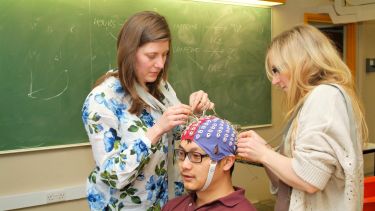Masters courses in psychology
Our taught masters programmes are great preparation for a PhD or the next step towards clinical training.

On
Do you have a question? Talk to us
Book a 15-minute online meeting with our Director of Postgraduate Recruitment to find out more information and ask further questions.
Courses in psychological research methods
Courses in cognitive neuroscience
The Scott & Caroline Beaumont - Neuroscience Postgraduate Scholarships
The University of Sheffield is offering two scholarships for home fee-paying students starting an eligible taught postgraduate course in the Neuroscience Institute. The successful applicants will have the £10,000 award paid towards their tuition fees.
You may also be interested in:

Masters study discovery afternoon
See where a Sheffield masters could take you with our on-campus event. Get expert advice, take a campus tour and chat to current students.
